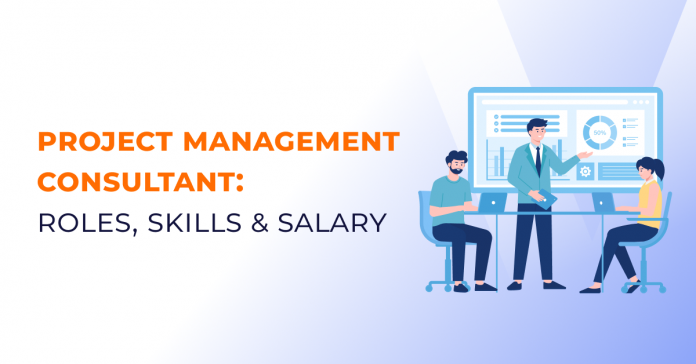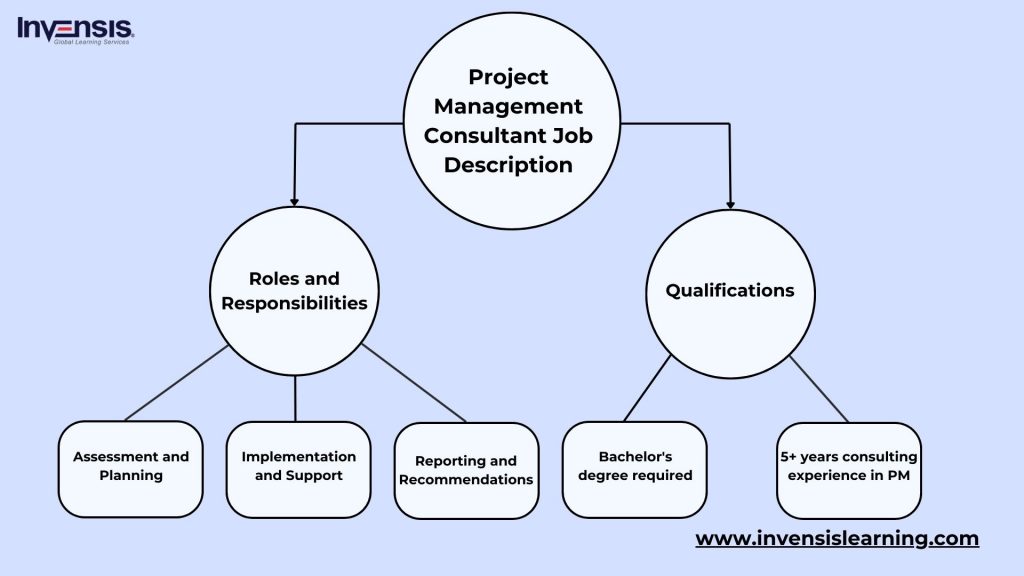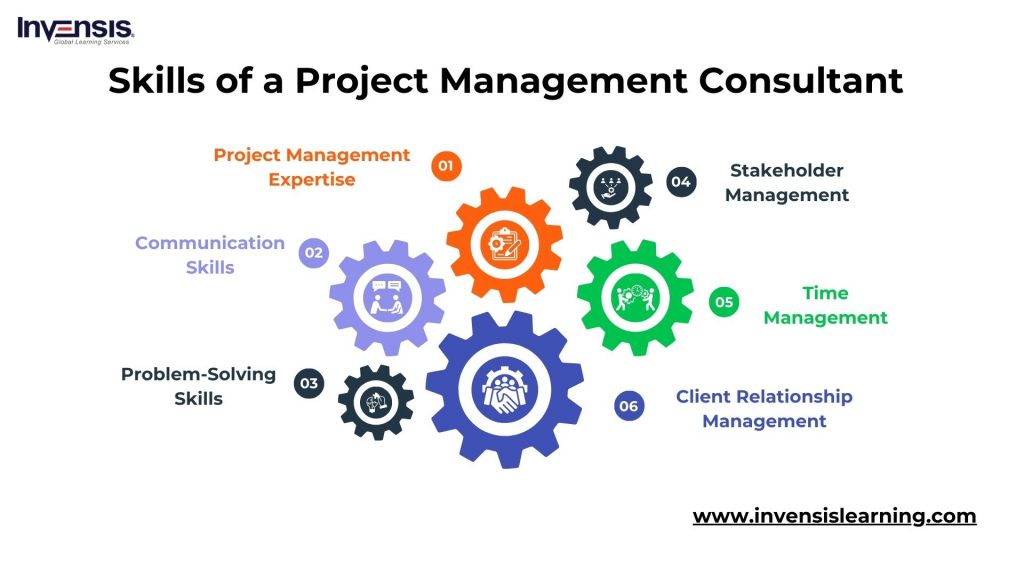
Are you a project management expert looking to take your skills to the next level? Consider a career as a project management consultant! In this job role, you’ll apply your expertise to help organizations streamline their projects, maximize efficiency, and achieve their goals.
This blog will be your one-stop solution for everything you need to know. We’ll break down the typical job description, outlining the daily tasks and responsibilities you can expect.
But that’s not all! We’ll also explore the essential skills that make you a standout consultant, from communication and leadership to problem-solving and risk management.
Stay tuned for valuable insights to help you determine if project management consultancy is the right fit for you and equip you with the knowledge to thrive in this exciting field.
Table of Contents
- Who is a Project Management Consultant?
- Project Management Consultant Job Description
- Essential Skills Required for a Project Management Consultant
- How Much Does a Project Management Consultant Earn?
- Project Management Consultant Career Roadmap
- Conclusion
Who is a Project Management Consultant?
A Project Management Consultant is an experienced professional specializing in optimizing project execution. With deep expertise in project management methodologies and tools, they assist clients in defining objectives, crafting plans, managing risks and stakeholders, and ensuring quality throughout the project lifecycle.
Their strategic guidance and collaborative approach empower teams to achieve successful outcomes within defined constraints. These consultants excel in communication and leadership, guiding organizations through complex projects and delivering value across industries.
Project Management Consultants play a pivotal role in enhancing project management capabilities and driving organizational success. Whether working independently or within consulting firms, they leverage their experience to streamline processes, mitigate risks, and foster effective stakeholder communication.
By facilitating alignment and decision-making, these professionals contribute to achieving project goals and delivering accurate results for clients across diverse sectors.
Project Management Consultant Job Description
The Job Description outlines the key responsibilities, qualifications, and expectations associated with the role of a Project Management Consultant. This comprehensive document guides potential candidates, detailing the essential tasks and skills required to excel in this position.
By providing a clear overview of the role’s requirements and objectives, the job description helps applicants and hiring managers ensure alignment between the candidate’s capabilities and the organization’s needs.
Roles and Responsibilities
The roles and responsibilities of a Project Management Consultant typically include:
Assessment and Planning
- Analyze the organization’s current project management processes to identify strengths, weaknesses, and areas for improvement
- Collaborate with stakeholders to understand project goals, timelines, and budgets
- Develop a customized project management plan that aligns with the organization’s needs and objectives. This might involve recommending new methodologies, tools, or software
Implementation and Support
- Work alongside internal project teams to implement the agreed-upon plan. This could involve training staff on new methodologies, developing project management tools, and facilitating communication channels
- Monitor project progress, identify potential risks, and propose solutions to keep things on track
- Provide ongoing support and guidance to project teams throughout the project lifecycle
Reporting and Recommendations
- Generate reports to track project progress, analyze data, and identify trends
- Present findings and recommendations to stakeholders, demonstrating the impact of the implemented plan
- Continuously seeking improvement opportunities and suggesting adjustments to optimize future project delivery
Qualifications
- Bachelor’s degree in business administration, management, or a relevant field is required
- Minimum of 5 years experience in consulting for project management
- Exceptional organizational, communication, and leadership capabilities are essential
- Demonstrated proficiency in analytical thinking and problem-solving is required
- Previous experience in handling intricate projects involving diverse stakeholders is necessary
- Proficiency in various project management methodologies and tools is expected
- The ability to work autonomously and effectively manage multiple tasks concurrently is required
Essential Skills Required for a Project Management Consultant
The role of a Project Management Consultant demands diverse skills to effectively navigate the complexities of project execution and deliver successful outcomes.
Some essential skills required for the profile include:
Project Management Expertise
Project management expertise encompasses various knowledge and skills in planning, executing, monitoring, and controlling projects. This includes understanding various project management methodologies such as Agile, Waterfall, or Scrum and proficiently using project management tools like Gantt charts, Kanban boards, or project management software.
It also involves the ability to develop comprehensive project plans, define project scope, allocate resources effectively, create realistic schedules, manage budgets, and mitigate risks throughout the project lifecycle.
Communication Skills
Effective communication is vital for a Project Management Consultant to convey project objectives, expectations, progress, and requirements to stakeholders. This includes verbal communication during meetings, presentations, and discussions, as well as written communication through emails, reports, and project documentation.
Consultants must be skilled at articulating complex ideas clearly and concisely, tailoring their communication style to different audiences, and actively listening to stakeholders to understand their needs and concerns.
Problem-Solving Skills
Problem-solving skills are critical for identifying issues, analyzing root causes, and developing effective solutions to overcome challenges during project execution. This involves gathering relevant information, evaluating alternatives, weighing risks and benefits, and making informed decisions to address problems.
Consultants must be proactive in anticipating potential issues, resourceful in finding creative solutions, and continue driving toward resolution.
Stakeholder Management
Stakeholder management involves building and maintaining relationships with individuals or groups impacted by the project, including clients, team members, vendors, and other stakeholders.
This requires effective communication, active engagement, and alignment of interests to ensure stakeholder expectations are managed, concerns are addressed, and support is garnered for project initiatives.
Time Management
Time management skills are essential for prioritizing tasks, allocating resources, and meeting project deadlines effectively. This involves setting realistic timelines, breaking down tasks into manageable activities, identifying critical path activities, and optimizing resource utilization to ensure project milestones are achieved on time.
Consultants must manage their time efficiently, delegate tasks appropriately, and minimize distractions to stay focused on project objectives.
Client Relationship Management
Client relationship management is about building and maintaining positive relationships with clients throughout the project lifecycle. This involves understanding client needs and expectations, communicating effectively, managing feedback and expectations, and providing exceptional customer service.
Consultants must be responsive, proactive, and transparent in their client interactions, building trust and confidence in their ability to deliver value and achieve project success.
How Much Does a Project Management Consultant Earn?
The earnings of a Project Management Consultant can vary widely depending on factors such as their level of experience, geographic location, industry, and the specific organization they work for.
Generally, project management consultants tend to earn competitive salaries due to their specialized expertise and the valuable services they provide.
- The base salary of a Project Management Consultant ranges from between ?6L – ?15L/yr. The average salary for a Project Management Consultant is ?8,26,527 in India
- Project Management Consultants in the USA earn an average salary of $154,019. However, it’s important to consider that salaries can vary and typically range between $137,371 and $170,864
- In the United Kingdom, Project Management Consultants earn an average annual salary of £50,278. The average additional salary for Project Management Consultants ranges from £1,506 to £5,503
- In Canada, the annual salary for a Project Management Consultant is $80,166. Additionally, the average additional salary for Project Management Consultants ranges from $63K – $90K/yr
- The base salary of a Project Management Consultant ranges from between $105K – $138K/yr. The average salary for a Project management consultant is $110,000 in Australia
Project Management Consultant Career Roadmap
The Career Roadmap for the Project Management Consultant outlines the typical trajectory and milestones professionals follow as they progress in their careers in project management consulting.
This roadmap highlights key stages and achievements:
- Skills: A successful Project Management Consultant must possess a strong foundation in project management principles and methodologies. This includes proficiency in various approaches such as Agile, Scrum, PMBOK, and Prince2, tailored to diverse organizations’ specific needs and preferences.
- Experience: Beyond theoretical knowledge, practical experience is essential for effective project management consulting. Professionals should ideally have 5-10 years of hands-on experience as project managers, allowing them to draw from real-world scenarios and insights to provide valuable guidance to clients.
- Expertise: It is crucial to demonstrate expertise in resolving challenges and achieving successful outcomes in project management. Consultants who can showcase their ability to navigate complex situations and deliver viable solutions become invaluable resources to organizations seeking guidance
- Training: Continuous learning and professional development are vital for staying abreast of evolving methodologies and tools in project management. Consultants should invest in training programs and educational opportunities to enhance their understanding and application of effective project management practices
- Certification: Project management certification adds credibility and validation to a consultant’s skills and expertise. Certifications such as PMP (Project Management Professional) or PRINCE2 certification serve as independent verification of proficiency in project management, making consultants more competitive in the field
Conclusion
Project Management Consultant is pivotal in driving project success. This blog has emphasized the essential responsibilities and skills required for individuals in this field. With expertise in project management methodologies, strong communication, leadership, and problem-solving abilities, consultants guide organizations through every project execution stage.
As the demand for skilled professionals grows, aspiring consultants can prepare themselves for a rewarding career by using their skills and staying up-to-date with industry trends. Ultimately, Project Management Consultants deliver client value and drive organizational growth through effective PM practices.
Ready to take your project management expertise to the next level?
Invensis Learning offers a comprehensive suite of Project Management Certification Courses designed to equip you with the skills and knowledge you need to thrive as a Project Management Consultant. Boost your resume and advance your career with industry-recognized certifications like PMP or PRINCE2.

















